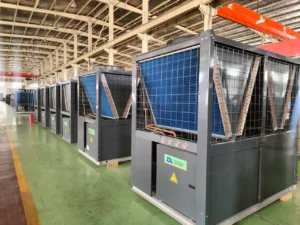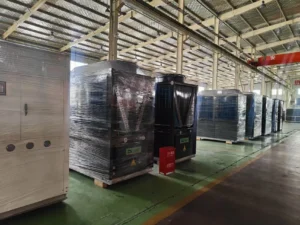Air-source heat pumps, as an energy-efficient heating/cooling technology, have seen widespread application in residential, commercial, and industrial sectors in recent years. Their core advantages are primarily reflected in the following aspects:
High Energy Efficiency Air-source heat pumps transfer ambient heat energy rather than directly consuming fuel or electricity for heat generation. With a typical Coefficient of Performance (COP) above 3.0, they generate over three times more heat energy per kilowatt-hour of electricity consumed compared to traditional electric heating systems, achieving more than 70% energy savings. Advanced low-temperature models maintain stable operation even in frigid conditions (-10°C to 0°C), making them suitable for northern regions during winter.
Environmental Sustainability These systems produce no exhaust gases or waste residues during operation, significantly reducing carbon dioxide emissions and air pollutants. When integrated with solar photovoltaic power generation, they can achieve near-zero carbon operation, aligning with China’s “Dual Carbon” policy goals.
Enhanced Safety Eliminating risks of gas leaks or explosions, their separated water-electricity design prevents electrical hazards, particularly advantageous for residential buildings and high-occupancy venues.
Multi-functional Integration Capable of providing both heating (through radiant floor systems or radiators) and cooling (via fan coil units), some models also supply domestic hot water, delivering three functions in one unit.
Flexible Installation Requiring no dedicated equipment rooms, outdoor units can be installed on rooftops, courtyards, or other well-ventilated areas. Their minimal structural modification requirements make them ideal for both existing building retrofits and new constructions.
With comprehensive advantages in energy conservation, environmental protection, safety, and multi-functional performance, air-source heat pumps are progressively replacing traditional heating methods, emerging as the mainstream choice in the low-carbon era.


